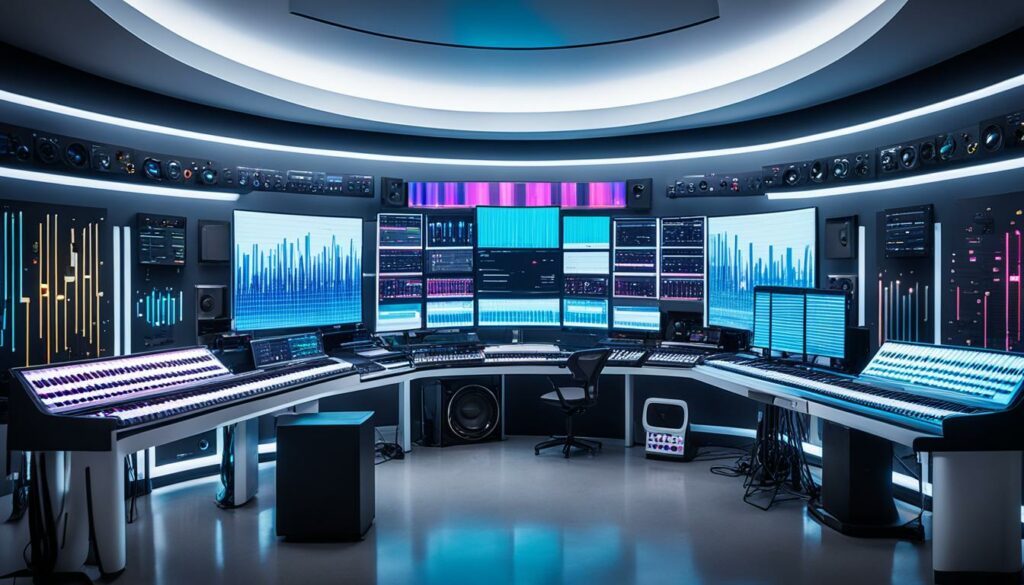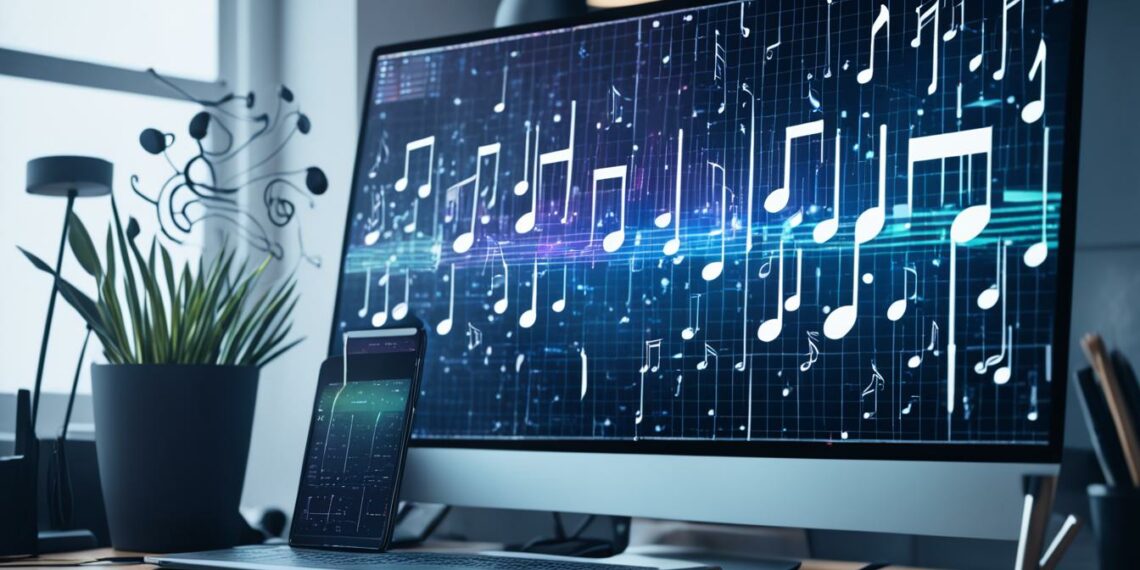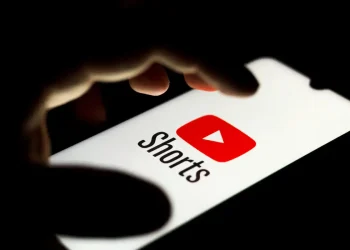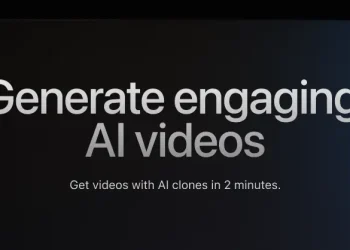Did you know the first AI-composed music, the Illiac Suite, came out in 1957? This piece marked the start of a big change in the music world. Now, AI for music has grown a lot, with tools like OpenAI’s MuseNet and Google’s Magenta making everything from classical to modern hits.
AI music generation lets musicians create songs in new and better ways. It helps with the boring parts and tries out new sounds. This means both experienced and new artists can explore more in their music. Automated music making also makes it easier for anyone to make music, no matter their music skills.
This change shows how AI is changing songwriting. It’s opening up new ways for artists to be creative. For more on how AI is changing creativity, check out this insightful overview.
Key Takeaways
- The integration of AI in music began with the Illiac Suite in 1957.
- Modern tools like MuseNet can create diverse musical genres.
- AI enhances creativity by enabling rapid idea generation and experimentation.
- Automated music composition democratizes music-making for those without formal training.
- Collaboration between AI and artists can lead to groundbreaking works.
The Emergence of AI in Music Composition
AI has changed the way we make music. Generative AI algorithms create new tunes, chords, and beats by looking at lots of music. These models use neural networks to spot patterns and styles. This lets them make unique songs that show off different musical styles.
Tools like Soundful and Google’s Magenta use AI to make music making easier. They look at music data to help artists try out new sounds. Tools like Amper Music also make making music cheaper and easier for new artists.
AI is now used in ads and video games, making music that’s hard to tell is made by a machine. But, there are still issues like worries about originality and copyright. Some see AI as a way to make music better, while others think it can’t replace human creativity.
AI is getting better and will likely change music making a lot. Artists will work with AI to make music that’s deep and full of emotion. With AI’s help, musicians can make music that’s creative and new, starting a new chapter in music.
Understanding AI for Music Composition
To understand AI in music, we must look at its roots in machine learning music composition and neural networks. AI composer algorithms have grown a lot thanks to tech and computing power growth. They look at a lot of music to make new tunes that sound like old ones or create new sounds.
Recurrent Neural Networks (RNNs) are key to this tech. They work well with music because each note builds on the last one. Long Short Term Memory (LSTM) networks are great at remembering music themes over time.
Generative Adversarial Networks (GANs) bring a new twist. They use two networks to compete, one making music and the other checking its quality. This leads to very complex and interesting music.
Projects like Sony’s Flow Machines show how far AI has come. They made a pop song called “Daddy’s Car” in 2016 using AI. This shows big steps forward in machine learning music composition.
AI in music is getting more popular thanks to deep learning and cloud computing. Tools like the Generative Pre-trained Transformer 3 (GPT-3) can make music that sounds good with just a little input. Sites like Jukin and Amper Music help creators make music easily and boost their creativity.
Technologies like WaveNet and Transformer models let AI make high-quality audio and predict sounds. This opens up new kinds of music styles. AI tools help artists focus on their art and make music faster.
AI music brings up big questions about copyright, ownership, and artist rights. We need to think about how to share royalties and credits when humans and machines work together.
| Technology | Functionality | Notable Use Case |
|---|---|---|
| RNNs | Process sequential data, essential for music creation | Real-time music generation based on previous notes |
| LSTM | Learn long-term dependencies in sequences | Creating coherent musical motifs over time |
| GANs | Compete to generate high-quality music | Innovative music generation with unique characteristics |
| GPT-3 | Generates music with minimal input | Automated song composition in diverse styles |
How AI Tools Enhance Songwriting
AI tools for songwriting are changing the game for musicians. They bring new ideas and make exploring music easier. With advanced algorithms and deep learning, these tools help overcome writer’s block and boost creativity.
Creativity and Inspiration
AI tools spark imagination in music composition. They look through vast music databases for inspiration. This lets artists try new things and move past old song patterns.
It opens up new sonic territories for musicians. This broadens their artistic reach.
Efficiency and Productivity
AI in music composition also means more efficiency. Generative AI quickly creates drum beats and chord progressions. This saves time and lets musicians focus on improving their songs.
| AI Tool | Description |
|---|---|
| Magenta Studio | Music plugins based on open source tools for music generation. |
| Orb Producer Suite | Helps create melodies, basslines, and wavetable synth sounds. |
| Amper | Creates unique music from scratch without pre-created material. |
| AIVA | Composes emotional soundtracks for ads, video games, and movies. |
| MuseNet | Generates songs with up to 10 instruments in various styles. |
| Jukedeck | Composes original music using deep neural networks. |
| WavTool | Generates new sounds and MIDI composition through text-to-music. |
| Brain.fm | Creates music to enhance productivity and focus. |
| Ecrett Music | Generates music based on scene and mood descriptions. |
| Boomy | Community platform for creating and distributing original music. |
Key Technologies Behind AI in Music
The music industry is changing fast thanks to new tech. These include machine learning, neural networks, and transformer models. They make music production and composition more innovative and personalized.
Machine Learning and Neural Networks
Machine learning helps analyze big music datasets to find patterns. Neural networks take it further by understanding music’s complex parts. This lets AI systems create music that feels human.
These techs help artists predict their music’s success and tailor it to different fans.
Variational Autoencoders (VAEs)
VAEs are key for music processing and creation. They spot complex patterns in music data. This lets AI systems make music that sounds creative and human.
VAEs encode music into a space where they learn to represent it. This leads to original, high-quality music.
Transformers for Music Generation
Transformers are great at working with music’s sequence. They’re perfect for making music from user input. Artists can try out new tunes and harmonies this way.
Using transformers makes songwriting faster and more creative. It opens up new sounds and styles in music.
Benefits of Automated Music Composition
Automated music composition with AI tools has big advantages for creators and the music industry. These tools change how music is made and enjoyed. The democratization of music through AI lets people without music training make great songs. This creates a rich space for creativity.
Democratization of Music Creation
AI music generators let a wide range of users make music. They produce high-quality sounds, making it easy to make professional tracks quickly. With just a few clicks, anyone can make a full song. This makes people try out different styles, sparking creativity in the music world.
Enhanced Musical Experimentation
Automated music composition opens up new chances for artists to try new things. AI tools create complex music structures, like harmonies and rhythms. This lets users make unique songs in styles like classical or modern. These systems help artists quickly make new versions and ideas, deepening their music knowledge and connection.
| Benefits | Details |
|---|---|
| Accessibility | Allows anyone to produce music without formal training. |
| Time Efficiency | Speeds up the music creation process, saving valuable time. |
| Cost-Effective | Reduces the need for expensive instruments and studios. |
| Experimentation | Encourages users to explore diverse musical landscapes. |
| Learning Tool | Facilitates hands-on experiences to enhance musical understanding. |
Popular AI Music Composition Tools
The music world is changing fast with new AI tools for making music. These tools help musicians and creators find new ways to write and compose songs.
Amper Music
Amper Music is a top choice for making royalty-free music that fits what users want. It lets users pick their music style, making tracks perfect for videos or ads. With Amper, making great music quickly becomes easier, boosting creativity.
OpenAI’s MuseNet
MuseNet by OpenAI is great at making complex music in many styles. It mixes ten different instruments for rich, detailed tunes. Users can try out new ideas by getting 4-minute pieces to work with.
AIVA
AIVA is an AI artist focused on film and game soundtracks. It uses AI to create music that matches emotional stories. AIVA helps users add music to their projects that brings stories to life and connects with audiences.

Other great tools include Soundraw, which lets you make unlimited songs and work together in real time. Musicfy.lol is known for AI voice cloning and turning text into music. Mubert offers endless unique tunes for different uses. Each tool has special features that are a big help for musicians and creators using AI in their work.
| Tool | Key Features | Pricing |
|---|---|---|
| Amper Music | Royalty-free music generation, user-defined preferences | Varies by use; subscription options available |
| MuseNet | Complex compositions, multipurpose use | Free access during demo period |
| AIVA | Soundtrack generation, emotional storytelling | Subscription pricing starts from $15/month |
| Soundraw | Unlimited song generation, collaboration features | $16.99/month annual, $19.99/month monthly |
| Musicfy.lol | AI voice cloning, text-to-music conversion | Starts at $9/month, Pro at $25/month, Studio at $70/month |
| Mubert | AI-generated music, customization options | Plans start from $12/month |
Collaborating with AI: A New Creative Partner
Musicians are now turning to AI collaboration in music to change how they write songs. By using creative AI tools, artists get a digital partner that helps with ideas, boosts creativity, and shapes unique songs. Sites like Splice.com show how musicians can work with tech that offers melodies and rhythms to help their creative work.
With AI as a co-writer, artists can easily make many versions of melodies and themes with just a click. This ability to come up with new ideas opens up new chances for exploration. Tools make sure AI-generated parts fit well with ongoing projects, keeping the rhythm and tempo right. Musicians mix their unique sounds with AI-made parts, combining live instruments and MIDI to make complete tracks.
The creative AI tools also make the music sound better. Artists can tweak AI-generated parts to make them clearer and have more control when mixing. With more musicians—60% already using AI—working together, this kind of collaboration is key to keeping up in today’s music world. Schools like The Atlanta Institute of Music and Media are helping artists learn how to mix and master their work for online sharing.
As AI becomes more common in making music, the line between tech and art gets smaller. Many see these tools as helpful, with almost 40% thinking AI fits their creative goals. This shows a move towards seeing AI as a partner, not a rival, in making art.
For more on AI’s impact in different areas, including marketing, check out this link.
The Impact of AI on the Music Industry
AI is changing the music industry in big ways. It brings new tools and raises important questions. AI is making music production faster and more creative. It’s also making us think about how it will affect artists and the true nature of music.
Positive Effects on Music Production
AI has made music production more efficient and creative. Tools like Amper Music and AIVA help musicians create new songs quickly. Big names in music, such as Universal Music Group, are working with YouTube to support AI music innovation.
Streaming services like Spotify and Apple Music use AI to make playlists just for you. This makes listening to music more fun and personal.
Concerns About Job Displacement
AI in music also worries people about losing jobs. Writers and actors have gone on strike because of AI’s growing role. Warner Music Group is fighting for artists’ rights against AI misuse. Many worry that AI could replace traditional music jobs.
Questions of Authenticity in AI-Generated Music
There’s a big debate about AI music being real or not. Critics say AI music lacks the feeling of human-made songs. It’s hard to tell AI music from human-made songs, which makes copyright and ownership tricky.
Artists like Travis Scott are using AI and VR to create new experiences. Finding the right balance between new tech and true art is key for the music industry’s future.
How to Incorporate AI into Your Songwriting Process
Adding AI to your music making can really boost your songwriting skills. It lets musicians and lyricists write new songs faster. It’s key to pick tools that fit your style and know what music you like. This makes the AI songwriting process smoother and more fun.
Choosing the Right Tool
Finding the right AI music tools is a big step in improving your songwriting. Tools like Jasper AI can come up with lyrics from simple prompts, helping you get past writer’s block. Sites like Amper Music and AIVA let you pick tracks and finish songs, so you can focus on your creative ideas.
Setting Musical Preferences
Setting your musical tastes helps AI tools match your creative aims. By giving examples of your favorite genres, moods, or song structures, you help AI make music that fits your vision. This makes the songwriting process quicker and more exciting. With AI, musicians can try out new sounds and create music in a fresh way.

Challenges and Limitations of AI in Music Composition
AI technology is changing how we make music, but it still faces big challenges. One big problem is its dependence on data. AI needs a lot of music data to create new songs. This can make the new music sound too similar to old songs, making us wonder about its originality.
It’s important to understand these limitations of AI music generation as musicians start using AI more.
Dependence on Data
The challenges of AI in music come from its need to learn from past music. AI can make songs fast, but humans take much longer, sometimes weeks. Yet, the AI music might not have the deep feelings we want in music.
- AI can mix genres in new ways, making music more creative.
- But, AI might not capture the real feelings we get from human music.
- Using old data too much could make all music sound the same.
- There are worries about copyright if AI music sounds too much like other songs.
- Combining AI with human creativity is key to keeping music emotionally rich.
AI brings new efficiency and creativity to making music, but we must see its limitations in music generation. Finding a balance between AI and human creativity is important for the future of music.
Future Trends in AI Music Generation
The music world is changing fast with AI. New tech is making music more personal and bringing artists and machines closer together. Now, we see more unique music made just for us.
AI music tools are getting better, reaching out to more people, even those who don’t know much about music. Tools like Beatoven, Soundraw, and Boomy let anyone make their own music. You can change the beat, add instruments, or change the notes easily, something only pros could do before.
New tech shows us how music is changing to fit what we want. Spotify’s AI DJ makes playlists just for you, with comments to explain why it picked those songs. UMG is working with AI companies to make music that fits our lives better.
Tools like Demucs and MusicGen offer advanced features like turning audio into MIDI, separating sounds, and fixing broken parts. These tools help musicians be more creative and work smarter. The future of AI in music means more kinds of music for everyone, from classical to hip-hop.
| Trend | Description |
|---|---|
| Personalized Music | AI makes music just for you, based on what you like. |
| Enhanced Collaboration | Artists and AI work together to make new music. |
| Accessibility | AI lets anyone make music, not just experts. |
| Technical Innovation | New tech like audio editing and MIDI conversion changes how we make music. |
| Diverse Genres | AI can make all kinds of music, from classical to hip-hop. |
As AI gets better, we’re talking more about how it changes music. AI could change how we make music, making us wonder about the feelings in machine-made songs. The future looks exciting for both musicians and music lovers.
Conclusion
AI for music composition is changing how we make songs. Over 60% of musicians use AI for tasks like mastering, artwork, or composing. Tools like Amper Music and OpenAI’s MuseNet help artists overcome creative blocks and boost productivity.
AI is getting better and can inspire artists and solve new problems. About 40% of artists like AI and see it as a way to meet their creative goals. This shows a bright future for music, where tech and human creativity work together to make new sounds.
But, AI in music also has its challenges, like missing the human touch in emotions and creativity. As we move forward, artists should use AI wisely. They should mix technology with their own vision to start a new chapter in music.
FAQ
What is AI for music composition?
AI for music composition uses artificial intelligence to help musicians create new music. It analyzes lots of music to make unique tunes. This technology uses machine learning to understand music patterns.
How does AI benefit songwriters?
AI helps songwriters by sparking new ideas and breaking through creative blocks. It automates some music making, letting artists focus on improving their work.
What technologies drive AI in music composition?
Technologies like machine learning and neural networks power AI in music. They help create music and understand complex musical patterns.
Can anyone use AI tools to create music?
Yes, AI tools make music making open to everyone. People without music training can now create great music. They can try out different styles easily.
What are some popular AI music composition tools?
Tools like Amper Music and OpenAI’s MuseNet are popular for making music. Amper Music creates music based on what you like, and MuseNet makes complex tunes in many styles. AIVA is great for film and game scores.
What challenges does AI music composition face?
AI music faces issues like relying too much on old data. This can make the music sound too familiar. Musicians need to know these limits when using AI.
How is AI shaping the future of music generation?
AI will bring better algorithms for more personalized music and work closer with human artists. As technology and our understanding of feelings grow, AI will change music making a lot.




